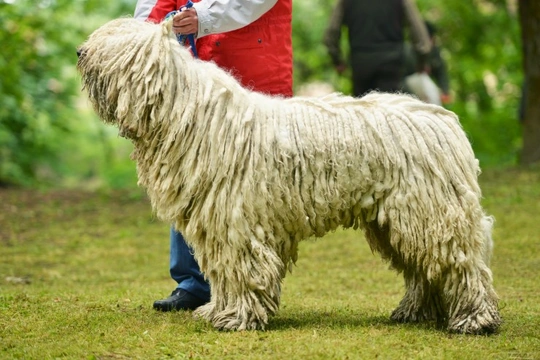
The Komondor and Known Health Issues
It would be fair to say the Komondor is one breed that turns a few heads with their glorious dreadlock coats. But it's not just their lovely looks that gets these dogs noticed because their kind and fun loving personalities keep owners and fans of the breed amused for hours too.
Orthopaedic Health Issues Seen in the Breed
Because the Komondor is a larger breed, they are more prone to developing certain orthopaedic issues which includes some hereditary disorders like hip and elbow dysplasia. Both disorders are often exacerbated when a dog known to be predisposed to either condition is allowed to carry too much weight. When a dog is overweight it puts a lot more pressure and strain on their joints which if already slightly compromised can make matters a lot worse. The result is a dog having to put up with a tremendous amount of pain and discomfort.
Bloat - Gastric Torsion
Bloat is another dangerous health disorder that's all too often associated with deep-chested breeds like the Komondor. When a dog develops bloat it can quickly prove fatal if left untreated because as their stomach becomes full of gas it rotates and as a result essential blood flow is cut off which can prove fatal. Signs of a Komondor experiencing bloat include the following:
- Dogs have trouble breathing
- They start drooling excessively
- A dog's abdomen becomes swollen and painful
Should your dog display any of the above symptoms and they have a habit of eating their food too fast, gulping it down rather than chewing it, you need to get them to the vet as a matter of urgency so they can be treated sooner rather than later when it could be too late and the condition turns into gastric torsion.
Hereditary Cataracts
The breed is also known to be predisposed to inheriting a few eye disorders from parent dogs which includes Hereditary Cataracts. Young dogs start to develop cloudy looking eyes and when they do, it's important for them to be checked out by a vet who would typically recommend surgically removing the cataracts to save a dog's vision. Again, this is a condition that needs to be treated by a vet as early as possible or you may find your Komondor's vision is impaired.
Entropion
Komondors are more at risk of developing another eye disorder known as Entropion which is an abnormality found on their eyelids and where they turn inwards. This sees them rub on a dog's cornea which is very painful and if left untreated, it can cause corneal ulcers which could eventually seriously impact a dog's vision.
Allergies
The breed is also more susceptible to developing allergies which results in them having irritated and sore skin. If left untreated, a secondary bacterial infection is more likely to take hold which is a condition known as Pyoderma. Should your Komondor develop any sort of rash, it's important for them to be checked out by the vet to determine just what is triggering the allergies. This is the only way of determining the problem so it can be eliminated from your dog's environment bearing in mind that it could be something in their diet that's the trigger.
Ear Infections
Because Komondors have such a lot of hair in their ears and more especially in their ear canals, moisture is more likely to build up in this delicate area. This can leave the way open for fungal and other infections to take hold. The signs of there being a problem is typically when your dog develops foul smelling ears and if left untreated ear infections when they get worse can be that much harder to clear up. In short, the early an ear infection is caught and treated, the easier it tends to be to clear up.
Hypothyroidism
When a dog's thyroid gland does not work as it should, producing the hormones needed to metabolise their food intake, it results in them suffering from a condition known as Hypothyroidism. The Komondor is among the breeds that's predisposed to suffering from this condition which is one of the most commonly seen in other breeds too.
The good news is that once the condition has been correctly diagnosed, it can be very successfully managed which in short means it does not necessarily have to negatively impact a dog's well-being. However, if the condition is left untreated it could seriously impact a dog's life which is why it's important to discuss any concerns with a vet so they can thoroughly examine your dog before recommending a long-term treatment.
Cancers
More Komondors are being reported as developing certain forms of cancer during the course of their lives which is why it's so important for owners to take their dogs along to the vet for regular annual health checks. If you notice any strange lumps or bumps developing on any part of your pet's body, it's very important to get them checked out and the same can be said if there's a change in a dog's behaviour and their eating habits.
The sooner a vet is able to establish if there is a cancer problem, the quicker a treatment can be set in place and as with a lot of cancers, the earlier they are treated, the better the outcome tends to be.



